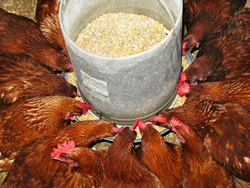 Major livestock and poultry trade associations sent a letter to the House Ways and Means Committee this week asking that they allow the blenders’ tax credit and associated tariff for ethanol to expire at the end of this year. The request was made in a letter signed by industry trade associations, including the American Meat Institute, the National Turkey Federation, the National Chicken Council and the National Cattlemen’s Beef Association.
Major livestock and poultry trade associations sent a letter to the House Ways and Means Committee this week asking that they allow the blenders’ tax credit and associated tariff for ethanol to expire at the end of this year. The request was made in a letter signed by industry trade associations, including the American Meat Institute, the National Turkey Federation, the National Chicken Council and the National Cattlemen’s Beef Association.
“The blender’s tax credit, coupled with the import tariff on foreign ethanol, has distorted the corn market, increased the cost of feeding animals, and squeezed production margins — resulting in job losses and bankruptcies in rural communities across America,” the groups wrote.
 The ethanol industry begs to disagree and contends that the livestock industry just wants cheap feed. “Once again, corporate livestock interests are seeking to return to the days they bought corn under the price of production for the American farmer. Such practices resulted in farmers getting more income from the government than they could from the marketplace, while corporate livestock industries prospered,” responded the Renewable Fuels Association in a statement. “Ethanol is not the major driving force behind corn prices, whether they are rising or falling. Oil prices, speculation, weather, and a host of other factors have far more to do with the price of corn than ethanol production. Consider that since the peak of corn prices in 2008, oil prices have fallen by half and speculation in grain markets has eased considerably.”
The ethanol industry begs to disagree and contends that the livestock industry just wants cheap feed. “Once again, corporate livestock interests are seeking to return to the days they bought corn under the price of production for the American farmer. Such practices resulted in farmers getting more income from the government than they could from the marketplace, while corporate livestock industries prospered,” responded the Renewable Fuels Association in a statement. “Ethanol is not the major driving force behind corn prices, whether they are rising or falling. Oil prices, speculation, weather, and a host of other factors have far more to do with the price of corn than ethanol production. Consider that since the peak of corn prices in 2008, oil prices have fallen by half and speculation in grain markets has eased considerably.”
Indeed, the meat producers’ letter points out that a September 2008 report by the Congressional Research Service (CRS) stated that the dramatic increase in livestock production costs were attributed to higher costs for feed. The CRS report said that “the main driver was feed, which may account for 60%-70% of total livestock production costs in any given year.”
What the letter does not point out, however, is that the same report gave a number of reasons for the higher feed costs, including strong economic growth in developing countries, weather-related crop shortfalls (mostly in other countries and not corn), surging U.S. corn exports, higher demand for feed from livestock producers, increased corn production costs mainly to higher energy-related (fertilizer and fuel) costs, and actions by a number of foreign governments to insulate their own markets from high commodity prices. Government biofuels policy was noted as a contributing factor as well, although it was also noted that ethanol by-products can be fed by livestock producers to help offset higher feed corn prices, which makes the overall impact on feed prices difficult to assess.

